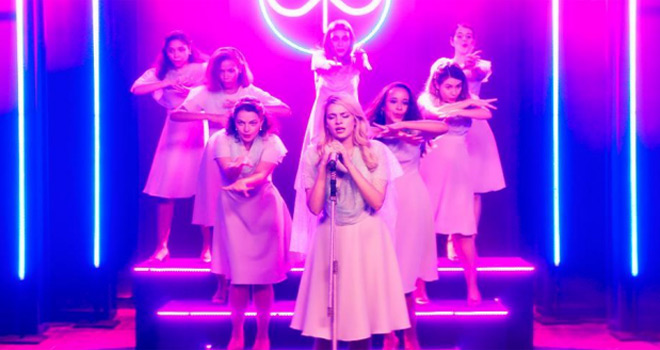It may only be her sophomore feature, but Brazilian Filmmaker Anita Rocha da Silveira is already taking on the patriarchy and authoritarianism with Medusa – a Psychodrama with a strong message. Released in cinemas on July 14th, and is also available on PVOD and ESVOD through Peccadillo Pictures, not only does the film have something to say about the national conservatism of Jair Bolsonaro (who was in power when the film was made), but it is also inspired by the increase of radical and evangelical Christian groups and the rise of females committing violence against other females.
Medusa opens on a dark night. A group of women wearing creepy looking white masks stalk a lone woman through the streets. Once they catch up with her they beat her and call her names such as “Jezebel” and “Slut.” They only stop hitting her when she promises to submit to God and take Jesus into her heart. Her confession is filmed on a phone and for the perpetrators it is another night’s work well done.

These women are the ‘Treasures,’ an evangelical vocal group. Raised within the church to equate outer beauty with inner virtue, they believe that any type of progressivism must be stomped out. When one of the Treasure’s nightly attacks goes wrong, group member Mari (Mari Oliveira: Kill Me Please 2015, Baile de Máscaras series) is left scarred. Now no longer ‘beautiful,’ Mari decides to try and track down a mythical girl called Melissa who is deemed to be the biggest sinner ever to inhabit the town.
Overall, there is a lot to dismantle in this film. Whilst Medusa certainly has something to say about the patriarchy and about those who look to oppress others, at its heart this is a film about women. The way that women are treated by men, the way that women are treated by other women, and the way that society and religion treats women. Medusa seeks to bring both the audience and the characters a type of catharsis through the realization of their subjugation.

This all stated, Medusa is stylistically very strong. It makes use of horrific imagery and ideas, but never feels like an outright horror. It has trippy sequences and makes use of neon tones, playing into the psychological element. The synth-esque soundtrack also enhances the psychodrama nature of the film. Although, while Medusa has a lot of intriguing and topical ideas, it doesn’t always hit the mark. The one hundred and twenty eight minute running time does feel drawn out and yet in spite of its hefty running time, Medusa doesn’t quite fulfil all that it promises. Certain character arcs feel unfinished and sometimes the film does feel distracted by its visuals with the story suffering as a result. In this way, Medusa is a bit unevenly paced and may have benefitted from a slightly tighter edit.
Nevertheless, this is an intriguing effort from da Silveira and demonstrates an exciting filmmaker whose next film will be eagerly anticipated. For this Cryptic Rock gives Medusa 3.5 out of 5 stars.







No comment